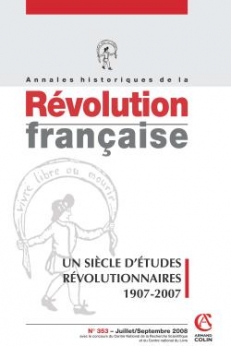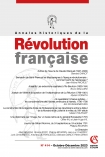
Annales historiques de la Révolution française n° 353 (3/2008)
Pour acheter ce numéro, contactez-nous
Recevez les numéros de l'année en cours et accédez à l'intégralité des articles en ligne.
En 1907, furent établies la Société des études robespierristes ainsi que sa revue, les Annales révolutionnaires, devenue en 1924 les Annales historiques de la Révolution française. Derrière cette création, se cache une rivalité entre deux historiens éminents, Alphonse Aulard et Albert Mathiez. Leurs points de vue historiques divergents et leurs fortes personnalités se heurtèrent, provoquant ainsi une querelle qui divisa les historiens de la Révolution en deux camps. Entre 1900, date de leur première rencontre, et 1908, date de leur rupture défi nitive, les deux érudits semblaient être des amis proches qui partageaient un enthousiasme commun pour la Révolution. La formation d’une nouvelle société et d’une revue historique par Mathiez et d’autres historiens et des hommes politiques loyaux à Maximilien Robespierre, considéré comme le porte-parole de la démocratie populaire, menaçait l’« école offi cielle » favorable à l’orateur dynamique et éloquent Georges-Jacques Danton. Mathiez et ses successeurs à la Société des études robespierristes allaient triompher.
In 1907, the Société des études robespierristes as well as its review, the Annales révolutionnaires, which became in 1924 the Annales historiques de la Révolution française, was founded. Behind this creation was a hidden rivalry between two eminent historians, Alphonse Aulard and Albert Mathiez. Their divergent historical points of view and their strong personalities clashed, thus provoking a quarrel dividing historians of the Revolution into two camps. Between 1900, the date of their fi rst meeting, and 1908, the date of their defi nitive rupture, the two scholars seem to have been close friends who shared a common enthusiasm for the Revolution. The formation of a new organization and a history journal by Mathiez and other historians and politicians loyal to Maximilien Robespierre, considered as the spokesman of popular democracy, threatened the « offi cial school », itself favorable to the energetic and eloquent orator Georges-Jacques Danton. Mathiez and his successors in the Société des études robespierristes were going to triumph.

